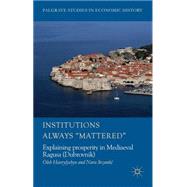Institutions Always 'Mattered' Explaining prosperity in Mediaeval Ragusa (Dubrovnik)
, by Havrylyshyn, Oleh; Srzentić, Nora- ISBN: 9781137339775 | 1137339772
- Cover: Hardcover
- Copyright: 12/10/2014
The mediaeval Republic of Ragusa (now Dubrovnik) was a prosperous economy that outperformed its Dalmatian rivals (Kotor, Split and Zadar). It enjoyed a period of rapid economic development in the 15th and 16th centuries. This study collects together evidence on how Ragusa compared to other economies of the region and addresses the difficult task of looking at the reasons behind its success.
Drawing on a vast amount of secondary literature, the authors use data to support their historical study of Ragusa. They provide a close analysis of its economic evolution, in particular looking at its policies and institutions. The authors, using the perspective of New Institutional Economics (NIE), test a number of hypotheses on the determinants of success. The authors argue that Ragusa exhibits the characteristics of an a 'Tiger' economy with growth-promoting institutions. Their findings reveal evidence which suggests that Ragusa had strong fundamentals with prudent finances, effective rule of law, good governance, social fairness, business-friendly institutions and trade openness.
This text offers a comprehensive historical case study of Ragusa's economy, making it essential reading for scholars and researchers of economic history and development theory.
Drawing on a vast amount of secondary literature, the authors use data to support their historical study of Ragusa. They provide a close analysis of its economic evolution, in particular looking at its policies and institutions. The authors, using the perspective of New Institutional Economics (NIE), test a number of hypotheses on the determinants of success. The authors argue that Ragusa exhibits the characteristics of an a 'Tiger' economy with growth-promoting institutions. Their findings reveal evidence which suggests that Ragusa had strong fundamentals with prudent finances, effective rule of law, good governance, social fairness, business-friendly institutions and trade openness.
This text offers a comprehensive historical case study of Ragusa's economy, making it essential reading for scholars and researchers of economic history and development theory.







